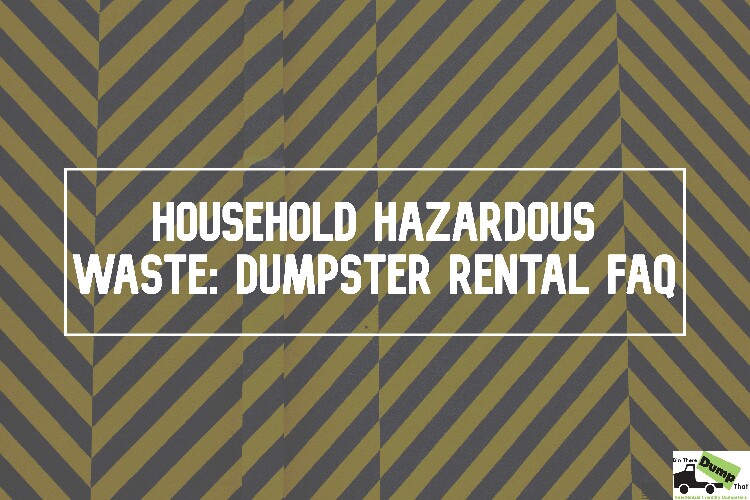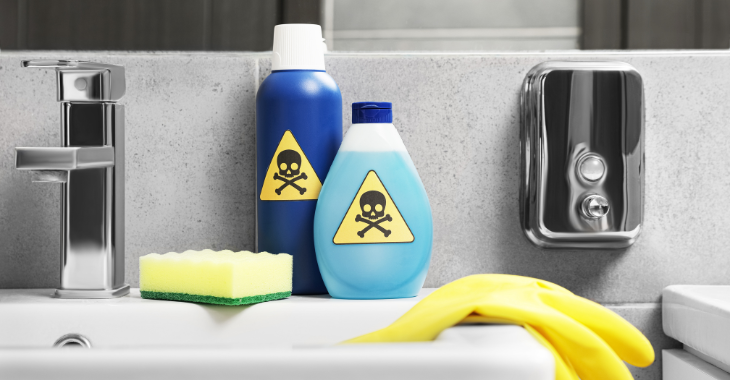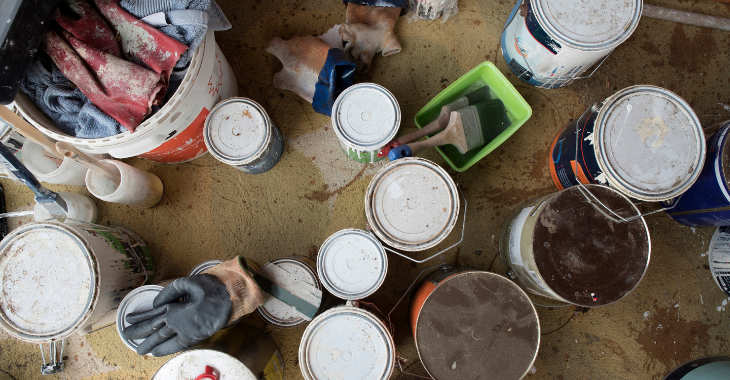
Many folks using Bin There Dump That often wonder, “Is there anything that can’t go into the dumpster?” and “What is considered household hazardous waste?”. These are common questions, and we're here to help you understand. It's important to know what's allowed and what's not when it comes to dumping stuff.
We want to make sure you can toss away what you need while being mindful of safety and the environment. Let's take a closer look at these questions, so you feel confident about what goes in our dumpsters and why we don't accept certain hazardous items.
Understanding Household Hazardous Waste For home renovations, spring cleaning, and even the aftermath of failed yard sales, opting for a residential dumpster rental can be the optimal solution when you find yourself grappling with a surplus of items to dispose of. Whether it's old drywall, scrap wood, that rusted out trampoline, or those boxes full of newspapers from the 1980s, all these items find a comfortable space in a Bin There Dump That waste disposal bin. However, it’s crucial to understand that household hazardous waste is the exception to this rule.
Physically, you can fit just about anything into a Bin There Dump That dumpster, but that doesn’t necessarily mean that you should. From corrosive to explosive and flammable to poisonous, here are household hazardous waste examples that cannot go into a residential roll-off dumpster rental:
*Dirt and masonry products are allowed only when arranged at the time of your dumpster rental order.

It’s not uncommon to think that the dumpster you rent can take anything you throw at it. And it can be frustrating to a homeowner when he or she learns there are some usage limitations. But that doesn’t mean Plan B should involve dumping your hazardous waste down the nearest sink, toilet, or sewer, as improper disposal poses significant risks to the environment and public health. It also doesn’t mean putting it out on the curb for trash day or burning it up in a backyard bonfire, which can lead to harmful emissions and pollutants. These actions are not only environmentally irresponsible but may also violate local regulations related to Household Hazardous Waste.
In recognizing the importance of responsible waste management, there are better, safer ways to go about disposing of any of those items listed above, ensuring compliance with guidelines surrounding Household Hazardous Waste.
Permanent Waste Collection Facility – Some communities have waste collection facilities that enable residents to drop off unused or partially used household chemicals. These locations may also offer an exchange program that allows other residents to recycle and reuse items you’ve dropped off.
Designated Community Collection Days – If a year-round facility isn’t available, community collection days probably are. Days can have special designations, so make sure you know what’s being collected on a given day.
Local Business Collection Sites – A few times a year, some area businesses will turn their location into a hazardous waste collection site. For example, auto mechanic garages may collect motor oil or a local hardware store will take in used propane tanks.
Curbside Waste Pick-up – Depending on the waste, transporting it to a collection site might not be ideal – or legal. Check with city hall for transporting waste in your community. Check in with any local environmental agencies to see if they offer curbside hazardous waste pick-up.
Our Dumpster Consultants are waiting to help you find an affordable solution to your waste disposal needs; we can't wait to help you with your project!
Understanding local regulations is crucial when dealing with household hazardous waste. Regulations vary by region, and it's essential to comply with specific guidelines to ensure safe and legal disposal. Many municipalities provide resources or have designated authorities that outline proper waste disposal practices. By familiarizing yourself with these guidelines, you can navigate the process more efficiently and avoid potential legal issues.
Connect with your local Bin There Dump That franchise operator for insights into regional regulations and guidance on navigating hazardous waste disposal within the confines of local laws. Our team is well-versed in the intricacies of household hazardous waste disposal and can assist you in adhering to local guidelines while utilizing our Dumpster services for responsible and eco-conscious waste management.
The environmental impact of hazardous waste mismanagement cannot be overstated. Improper disposal can lead to soil contamination, water pollution, and harm to wildlife. Responsible disposal practices play a pivotal role in minimizing these adverse effects.
By choosing eco-friendly waste disposal options, you actively contribute to a healthier environment. Recognizing the long-term consequences of improper disposal underscores the importance of making informed choices. Bin There Dump That is committed to not only providing convenient waste disposal solutions but also promoting environmental stewardship. Make an impact by choosing our services, ensuring that your hazardous waste is managed responsibly by not including it in our waste disposal bins, and minimizing harm to the environment and your community.

The next time you’re a little leery of what to dump and what not to dump, don't hesitate to connect with your local Bin There Dump That franchise operator! Our highly trained team can provide comprehensive assistance, guiding you through the intricacies of hazardous household waste disposal.
Whether you have queries about recycling practices for the various trash in your home or need information on environmentally friendly waste disposal options, we're here to help.
Friendly, professional customer service, plus fair pricing, equals value.